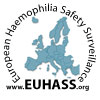News
|
9 Feb 2011 New blood-based test for variant CJD |
|---|
|
It was announced this week that a new blood based test for the detection of variant CJD has been developed by a group in London, UK. The assay had a sensitivity of 71.4% and a specificity of 100%. The only positive samples detected were from patients with variant CJD. This assay is not currently available outside this group’s research setting and no persons with haemophilia and who are in the at risk group for variant CJD have been tested. The abstract of the scientific paper describing the test can be found here
|
|
5 Jan 2011 EUHASS publication |
|
A paper describing the EUHASS program has been published. The manuscript can be downloaded from here
|
|
24 Sept 2010 Octagam Immunoglobulin Suspended |
|
The European Medicines Agency has recommended the suspension of the marketing authorisation for Octagam (Human Immunoglobulin) from Octapharma and asked for a recall of Octagam currently on the market in Europe. This suspension followed an unexpected increase in reports of thromboembolic events including stroke, myocardial infarction and pulmonary embolism in recipients of Octagam intravenous immunoglobulin. Further information
|
|
31 May 2010 Amorfix suspends development of the vCJD blood test diagnostic program |
|
Amorfix Life Sciences Ltd has announced that it has decided to suspend all development of their vCJD diagnostic test. Amorfix was considered to have been the leader in the race to develop a blood test to diagnose vCJD. Following the failure of their test to identify the plasma from a UK vCJD patient as positive the company has decided to abandon work on this test. Further information
|
|
17 Feb 2010 variant Creutzfeldt-Jakob Disease prion protein in a spleen of a patient with haemophilia |
|
The Health Protection Agency in the UK issued a press release on 17/2/2009 stating that vCJD prion protein had been found at post mortem in the spleen of a person with haemophilia. The patient died of a condition unrelated to vCJD and had no symptoms of vCJD prior to death. The route of transmission of vCJD to this patient is not yet known and is the subject of further investigation.
|
estigation.
IT Development and Support by MDSAS


